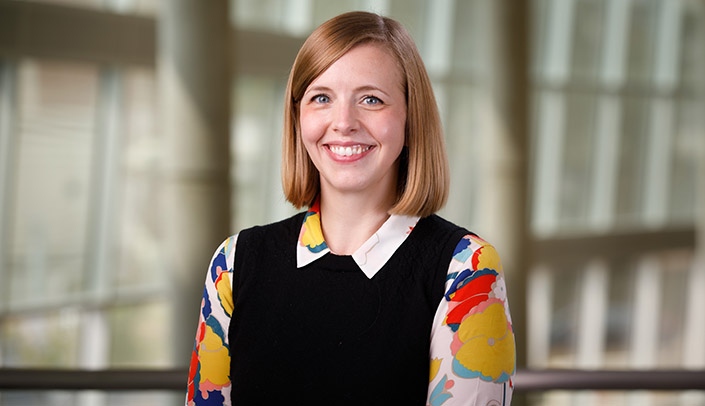Name: Melissa Teply, MD
Medical school attended: UNMC Class of 2010, woot!
Location of your residency/fellowship training:
- University of Michigan in Ann Arbor, Internal Medicine, graduated 2013
- Johns Hopkins University, Hospice and Palliative Medicine, graduated 2017
What residency/fellowship program at UNMC are you serving as program director for?
Hospice and Palliative Medicine Fellowship
Number of trainees:
We have funding for two adult-focused fellows and one pediatric-focused fellow. This year, we have two full-time adult-focused fellows and one adult-focused fellow finishing up a split fellowship from last year.
How long have you been the program director?
The fellowship reopened in 2020, so this is my second official year.
What made you choose to become the program director?
Palliative medicine is still an emerging field in health care, and there is high demand for palliative care clinicians, who are currently in low supply. Having a fellowship creates visibility for medical students, residents, fellows and even current physicians in practice to see this as a career path.
I am fascinated by trying to figure out how to break down the complex communication that we do into discrete skills that can be learned, mastered and then taught to other learners. I love the ripple effect that's created by teaching the palliative medicine fellows how to do this work, so they can go out and teach primary palliative care skills to other learners and colleagues.
What challenges do you foresee in graduate medical education in the future?
The greatest challenge that I see is how to balance the multiple competing demands placed on trainees during their residency and fellowship training. I would posit that the most important skill sets we have as physicians are our medical knowledge, the communication skills we have in conveying that knowledge and partnering with patients and working in teams. I constantly worry about how to balance these core skills with the additionally important issues around QI, patient safety and wellness, to name a few, while also allowing for time and space for reflection, which is equally important to the active learning process.
What are the strengths of your training program?
- We share didactics with the geriatrics fellows for an expanded/overlapping curriculum.
- Both our fellows and our faculty have a wide array of training backgrounds (internal medicine, family medicine, emergency medicine, pediatrics, geriatrics) and current practice environments (clinic, hospital-based consults, home hospice, long-term care), so we all are able to learn a great deal from one another.
- Our didactic curriculum includes a longitudinal experience with an integrative medicine specialist to improve the fellows' internal regulation, as a way of acknowledging our own emotions and reactions as providers about patient care issues so that we can provide the best healing presence possible when we meet with patients and families.
List some accomplishments that you are proud of:
- I have run two half marathons, which is a huge feat for me, having grown up as a self-selected "indoor kid."
- I attended several of Dr. Smith's improv comedy faculty development sessions (in spite of my trepidation) and I actually enjoyed the experience!
- I have three sons (ages 6, 4, and 2), and I am able to make it into work each day, mostly on time.
Tell us three things about you that others may not know:
- I still rent Netflix DVDs — I love all sorts of movies that aren't readily available on streaming services.
- I love karaoke. My current favorite song to sing is "Suspicious Minds" by Elvis Presley.
- My favorite food of all time is Kraft Macaroni and Cheese (yes, the powder cheese version).
